
Top 10 easy, yet critical SEO tips for eCommerce websites
Geupdate op december 21, 2023
SEO for eCommerce is one of the most competitive industries I can think about. Not only are you competing against giants like Amazon, Zalando, or Bol.com, but eCommerce keywords are also the most expensive ones. People who search on those keywords already have an intent to purchase something, making it super important to ‘win’ those customers.
You make a few quick sales when you run an ad campaign, but once the campaign has ended your site loses its visibility. While investing in SEO, you are actually targetting what people are searching for AND your website remains ranked in the long run. If you see your competitors running advertisement campaigns, they most likely are also investing in SEO at the same time! Try to stay ahead of them.
Want to know what to look for in a good SEO Partner? I pinned down a few tips on how you can find the best SEO agency for your business.

SEO for eCommerce… Why would I invest?
The web never sleeps! Your webshop is 24/7 open and anyone, from anywhere in the world, can place an order – if you ship worldwide. The traffic that comes to your store through organic search is lasting traffic with no ad spend.
Whether you like it or not, from now on, your new best friend is Google. They simply dominate the search and if your website is not on Google, people won’t find you. But no worries, once your SEO is on point and you see the traffic flow coming in, you’ll be glad that Google is your friend 🙂
Let’s dive right in!
#1 Basic SEO rules before we start
Before we start with the SEO tips, there are also some basic SEO rules that will affect your Google Rankings. It doesn’t matter how good your research might be or how many keywords you’re targeting. If the basic settings for your site aren’t there, Google will simply give you a harder time to rank.
Make sure your website …
- is secure – you would be surprised how many would still fail
- is fast – on both desktop & mobile!
- is user friendly – Google now ranks for ‘vitality’
- has no technical issues
- is responsive
- is up-to-date
#2 Find uncompetitive keywords
When you have a webshop that sells shoes, you’re not going to win on the keyword ‘buy shoes’. Try to be more specific and niche-based. If you’re a local business, try to target local keywords. You don’t get as much traffic on those specific keywords, but people searching for those keywords will result in a higher click-through-rate.
Another reason why you can easily find uncompetitive keywords is that you would be shocked by how creative people try to find shoes. Even if they give you only 10 visitors a month, because they’re so specific, they will give you a higher conversion rate.
Combine all those smaller, more specific keywords together and you’ll have a nice, steady growth in your monthly site visits. On the graph below, you can see that the traffic to the site is directly related to the number of keywords you’re targeting. Don’t stack keywords just for the sake of targeting keywords. You’ll receive a penalty for that. But if you keep targeting related keywords to your shop page, you’re good to go!
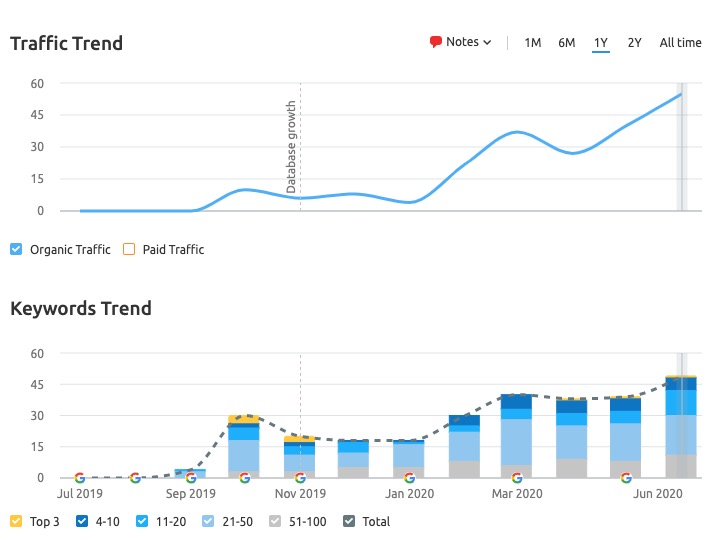
#3 Optimize category, product and filter pages
For a webshop, the category & product pages are without a doubt the most valuable. Just by simplifying your product titles and by adding simple keywords to those titles you can increase your ranking store magnificently. Let me give you a few examples to clarify what I mean by that.
You most likely have a collection on your website that displays products that are on sale. Instead of using a /collections/sale page, create multiple collections and make sure you insert purchase intents for your customers. Create a /collections/buy-summer-shoes-for-sale. The same goes for the titles of your pages. Instead of having a category ‘winter coats’, change the title in something like ‘purchase winter coats online’.
Try to add as many intents as possible, wherever possible. Your collections pages can easily be rewritten to /shop-woman instead of just /women. I want to make clear to you that the URL and the page titles are very important for your Google Ranking. If you use categories like /categry/7 instead of /category/bags, you’re already missing out!
Another trick is to make the filters on your webshop as specific pages as well. This way you are targetting even more keywords! If the filters on your website use parameters like /shoes?color=blue you should try to rewrite those URLs as /blue-shoes and /green-shoes. Want to combine filters? Write them as /blue-shoes+green-shoes. You’ll thank me later when you see your traffic flowing in like below!
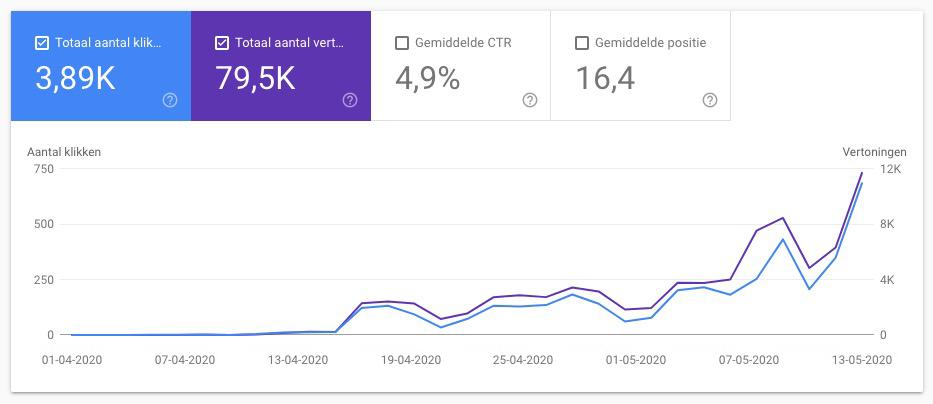
#4 Write new product descriptions
When you want people to find your shop when they Google for products, you need to put time in your product descriptions. Don’t just copy them from the manufacturer (duplicate content) but give them your own, original twist. Hire a copywriter to write professional product descriptions in the cool or funny way your brand would say it.
The best way to write product detail pages is to have a small intro (+50 words) that will target a lot of keywords. Take “Applewood Grill”, simple like that. Changing the title to “Applewood is what makes this the best grill in the world” will increase your traffic, as you’re targetting more keywords. Try to use a combination of the product’s name and a few keywords you would like to add.
A solid product page would consist out of an introduction paragraph, a list or table with features, a video (if available), and a closing paragraph. Obviously product shots are a MUST. And product reviews! But this seamlessly brings us to our next point 😉
#5 Use product reviews & Schemas
Product reviews just makes your customer happy and will give them the trust to buy your product. (unless the reviews are bad… but let’s assume that’s not the case). Product reviews will be displayed in the search results and will stand out from the rest. Reviews will not necessarily rank you higher, but they are eye-catchers. Meaning a higher click-through rate on your product.
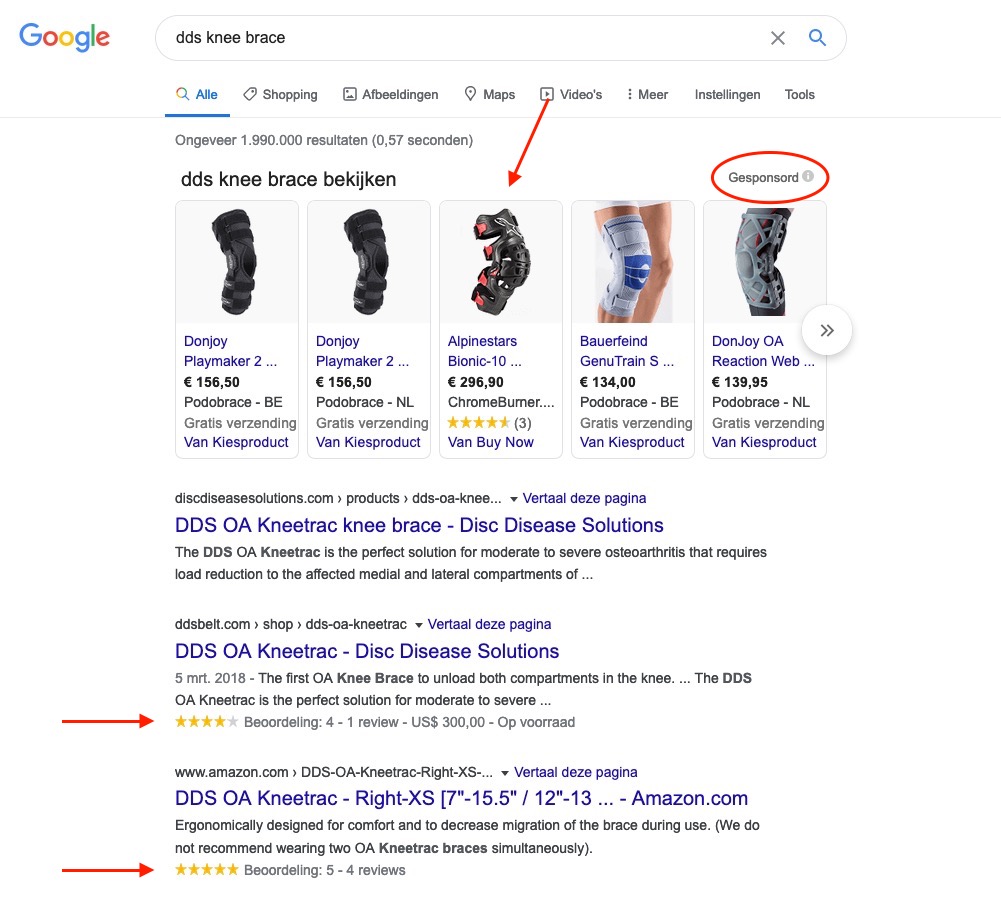
Note that the actual products on top of search results are sponsored. Also in your Google marketing campaigns, it’s important to flag content with reviews. It makes you stand out from the rest. You can easily request reviews from your customers through custom email follow-up campaigns.
To make it possible for Google to display reviews for your products, your website needs to make the correct use of the schema.org syntax. The website looks outdated, but oh boy… it makes a difference in your rankings. This is something you might need to ask your developer if it’s correctly implemented in your store or not. Make sure to check out our eCommerce services or our SEO Services if you’re interested. Or pick both 😉
Enough shameless self-promotion, let’s continue!
#6 Beware of duplicate content
I mentioned before in step #4 that it’s important to write new product descriptions and not just take the description provided by the manufacturer. This is actually really important. Having exactly the same content on your website as someone else will make you target the exact same keywords, it doesn’t make you stand out from your competitors and you are not providing a decent reason for your customers to purchase through your shop.
But there’s also another downside to duplicate content on your own website! I am writing this article about best practices for SEO and eCommerce, but I already have other pages on my website talking about these topics. While adding multiple content-pages about the same topics increases your expertise to Google, you’re also competing in the rankings with yourself. Google doesn’t know what page about SEO on my website is most important.
How can you fix this? You can mark pages on your website as a cornerstone and internally link to your most important SEO Service page. Poof, done. No really! It looks silly how I did it right here, but it’s the most hands-on example I can give you. It’s really that simple, yet no one does it correctly.
When handling duplicate content on your own website, you also need to make sure you’re using more specific URL parameters (not all content on your website about SEO can use the same URL). You can tell Google you have canonical URLs to make sure Google displays the original content and not some blog post you wrote. You can also correctly configure your URLs in the Google Search Console and add noindex, follow meta-tags to your pages to make sure you handle duplicate content correctly.

#7 Domain authority is key
Okay… It ended up being number #7, but domain authority is THE MOST IMPORTANT thing you need for SEO. Why is it so hard to rank higher than Wikipedia, Amazon, Bol.com, …? Because they have a domain authority of almost 100%. They can literally post anything on their website and rank #1.
Domain authority is super important and you can only increase your domain authority when other websites link to your shop. Why am I bringing this up? I see a lot of brands running their shop on a different domain than their actual website. WHY WOULD YOU DO THIS? You are splitting your authority over two domains. Which makes both of your domains harder to rank!
When other websites link to your product they need to choose to either link your main website, or your shop subdomain. Let’s say 10 other websites say: ‘Check out this product here’ and link to your shop page. While another 10 websites link to your main website by mentioning your brand. Both your shop subdomain and your main website will receive a domain score of 10. While you could have received a score of 20! Those backlinks are hard to get, so make sure they can’t go wrong.
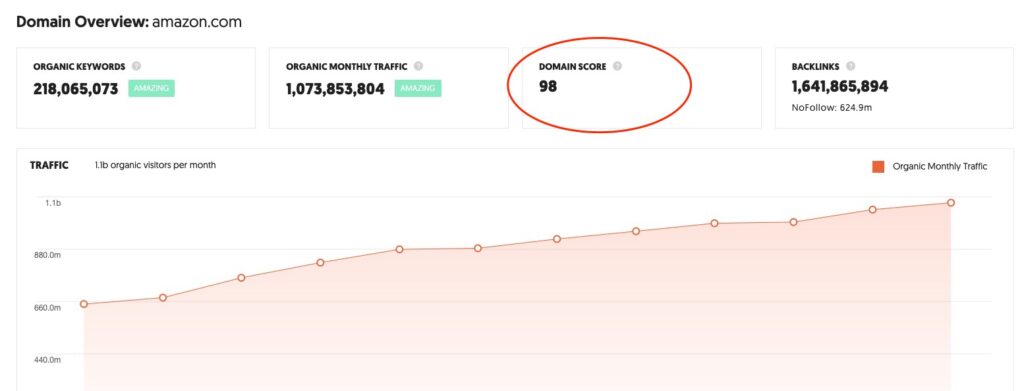
#8 URL Structure
With URL structure I simply mean the URL in the address bar while browsing through your website. Most people take it for granted, but it has a huge impact on your SEO rankings. The rule is, by reading the URL I need to know what your page will be about. This is how search crawlers interpret your content.
Don’t use dates in your URL. Google will link your page to that specific date, while your page has probably nothing to do with that date. If you use multiple languages on your website, please please pleaseee translate your URLs! Also, don’t use capital letters in your URL or any special character.
Your URL is also a free keyword tool! When possible try to add long-tail keywords in your URL. It’s really the easiest way for a higher page rank. So make sure NOT to take your URL structure for granted.
#9 Create authority pages
I already covered this topic with the duplicate content and in the domain authority topic. For pages on your website, it works kind-off the same as with the domain authority. Google needs to know what page on your website to show when you have multiple pages covering the same topic.
If your store offers 10 different pair of blue shoes, and a customer Googles for blue shoes, you need to let Google know what page on your website will give the best result. In this case, I would suggest giving your category /blue-shoes the main authority. The customer will land on your collection of blue shoes, which will have a higher conversion rate than when he strands directly on one shoe. (Except of course he/she specifically Googled that type of shoe, but that’s what long-tail keywords are for)
To correctly set up your authority pages you need to have a structured sitemap and a strong internal link-building into your own website. The best example I can give you of obsessively using internal link building is Wikipedia. But don’t link it just for the sake of linking.
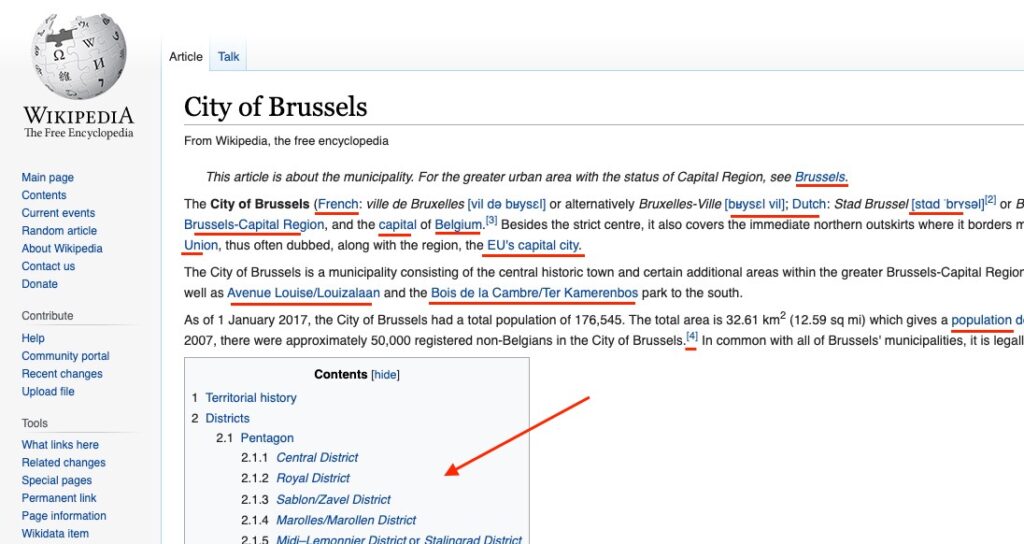
#10 Spy on your competitors
And last… but actually the thing you should do the first 🙂 Check out your competitors. If you sell blue shoes and your competitor sells blue shoes (otherwise it’s not a competitor) you need to see what they are doing! Are they ranking higher than you in Google? Are they advertising? What’s their domain score? How many backlinks do they have? What keywords are they ranking for? …
Before you even start making SEO changes to your website, I want you to check on your competitors. Is it worth spending your time on trying to beat them on the same keywords? For example, going after Amazon is quite crazy. So you can better put your efforts in long-tail or easy-to-rank keywords instead.
We are always happy to advise you on your SEO journey for your eCommerce business! We are a passionate team of digital marketers and strategists to make sure your brand is growing in the digital world.
Thank you for reading the entire SEO for eCommerce post and feel free to reach out to us!


Nieuwsbrief
Schrijf je in voor onze laatste updates, 1x per kwartaal!